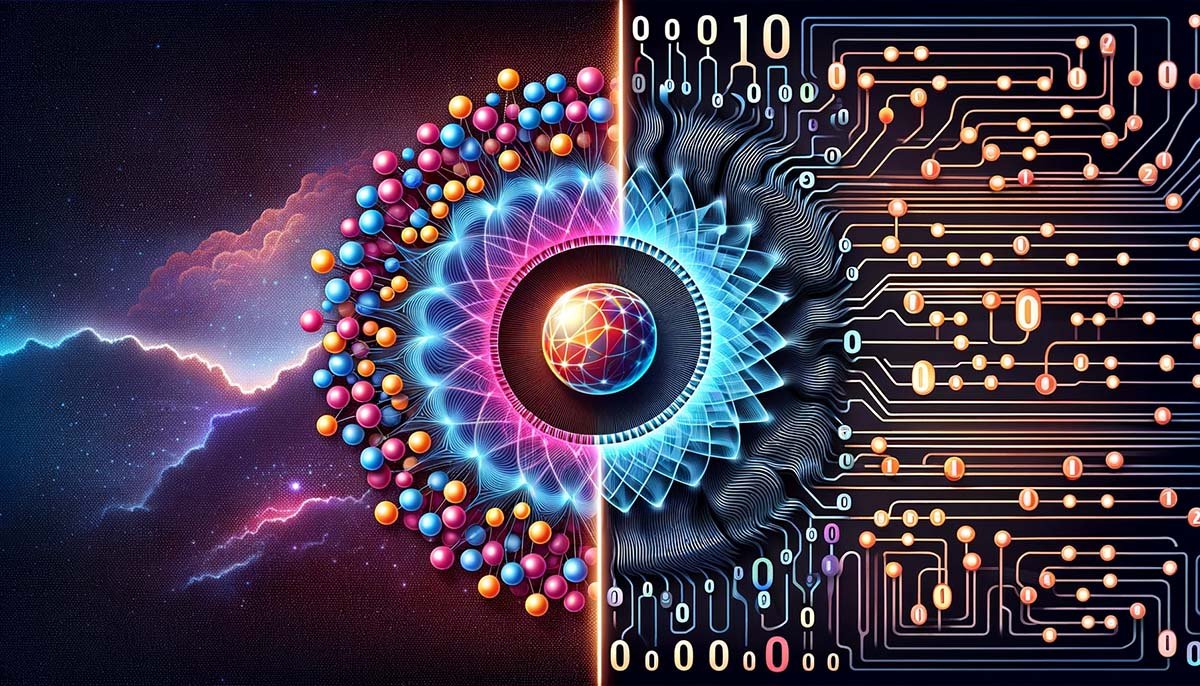In the fast-evolving landscape of technology, quantum computing’s arrival has initiated a groundbreaking debate about classical computing’s longstanding dominance. This discussion does not just peel back layers of computational theories but promises to reshape how we tackle some of the most intricate challenges. This comparison of the two paradigms delves into their methodologies, applications, and future potential.
Introduction
In today’s era of rapid tech progress, distinguishing between quantum and classical computing has captivated tech lovers, industry insiders, and the public. Classical computing, based on binary bits (0s and 1s), has fueled digital advancements, from basic calculators to complex supercomputers. Quantum computing, however, uses quantum mechanics’ unique properties to surpass classical limits, hinting at a future brimming with boundless computational capabilities.
Understanding Classical Computing
Fundamentals of Classical Computing
Classical computing relies on the binary system, utilizing bits as the primary data unit, representing either a 0 or a 1. This foundation enables machines to calculate, store data, and complete tasks. A classical computer’s core is its CPU, which acts as the brain, processing instructions from software by conducting basic arithmetic, logic, and input/output operations.
Capabilities and Limitations
Classical computers are adept at various tasks, such as powering word processors, internet browsers, and everyday software. However, they face difficulties with problems that demand vast data processing or simulate quantum events. Pushing classical computing’s boundaries also brings up issues like energy use and the physical limits of shrinking transistors.
To continue unraveling the mysteries of tomorrow’s technology, don’t miss our captivating blog on “Quantum Computing and AI Impacts & Possibilities.” Discover how these cutting-edge fields are merging to shape an unimaginable future.
Exploring Quantum Computing
Quantum Mechanics Basics
Understanding quantum computing requires a basic knowledge of quantum mechanics, which introduces concepts like superposition and entanglement. Superposition allows quantum bits (qubits) to be in multiple states simultaneously, while entanglement describes a connection between qubits that instantly affects one another, regardless of distance.
How Quantum Computers Work
Quantum computing’s heart lies in qubits, which are capable of conducting several calculations at once through superposition. Combined with entanglement, quantum computers can handle complex data sets more efficiently than their classical counterparts. Quantum gates alter qubit states, enabling parallel calculation execution and promising speed breakthroughs for certain problems.
Potential and Challenges
Quantum computing’s potential spans fields like cryptography, offering groundbreaking encryption and pharmaceuticals, speeding up drug discovery by precisely simulating molecular interactions. However, challenges like maintaining qubit coherence, scaling quantum systems, and correcting errors in a probabilistic computing environment persist.
Key Differences Between Quantum and Classical Computing
The dive into computing shows apparent differences between quantum and classical computing, affecting computational theory’s foundations.
Computational Approach
The computational methods of these paradigms significantly differ. Classical computing processes information in a linear bit sequence, facing limitations in computation speed and complexity. Quantum computing, however, uses qubits to enable parallel computation, addressing previously unsolvable problems.
Speed and Efficiency
Quantum computing’s speed and efficiency in processing complex data sets and solving certain problems could vastly surpass classical computing, enabling real-time solutions for problems that classical computers would take much longer to solve.
Application Areas
Quantum computing aims to transform areas like cryptography and material science, offering precise molecular interaction simulations. Classical computing continues to support daily computing needs and finds its niche in tasks not requiring quantum computing’s parallel processing.
Real-World Applications and Implications
Pharmaceuticals and security are two industries that quantum computing is expected to transform completely. While molecular simulations speed up drug discovery, quantum cryptography will provide theoretically unbreakable security. Classical computing remains vital, driving advances in AI, big data analytics, and maintaining our digital infrastructure.
The Coexistence Scenario
A future where quantum and classical computing coexist and complement each other is likely. Hybrid systems could optimize problem-solving across various fields, blending quantum’s specific calculation capabilities with classical computing’s broader task management.
Challenges and Future Prospects
Overcoming technical and ethical hurdles is crucial for advancing both quantum and classical computing. Quantum computing’s technical challenges include maintaining qubit coherence and scaling, while ethical concerns revolve around data privacy and security. Classical computing faces physical and environmental limitations, requiring innovative solutions for sustainable progress.
Future of Computing
The computing future looks promising, with quantum and classical technologies offering unique benefits. Hybrid computing could enhance efficiency in complex simulation fields, while classical computing advancements ensure its continued significance in the tech landscape. Quantum computing’s potential to solve previously impossible tasks heralds a new collaborative computing era, tailoring technology to specific challenges.
Conclusion
Comparing quantum and classical computing unveils a future rich with opportunities and hurdles. This journey is not about competition but merging strengths, where integrating quantum and classical computing broadens our computational capabilities. We are poised to unlock new possibilities by overcoming challenges and leveraging advancements, transforming computation and addressing humanity’s critical issues. This exploration highlights a quest for speed and a drive toward unlocking discovery, innovation, and understanding in our complex world.
Resources
Quantum Computing Vs. Classical Computing In One Graphic
Classical vs. quantum computing: What are the differences?
Quantum Versus Classical Computing and the Quantum Threat

